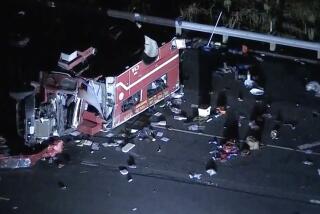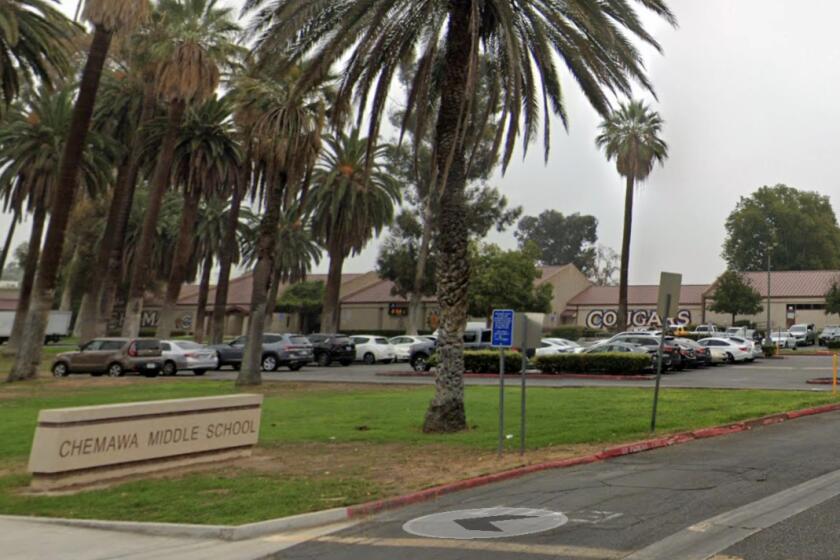Critics Fear Plan Gives Mayor Too Much Power
Mayor Antonio Villaraigosa’s call for a dramatic change in how local schools are governed received a largely harsh reception Tuesday as critics questioned whether the plan would give him too much power, and even supporters warned of significant political opposition.
A number of smaller cities within the 727,000-student Los Angeles Unified School District also viewed the proposal skeptically, saying they would have too little say in district matters.
And those who praised the mayor’s plan said implementing it would be a tough battle. Former Mayor Richard Riordan said the changes would improve education but predicted there would be “blood on the floor” before it was all over.
In his first State of the City speech, Villaraigosa called for schools to be governed by a council of mayors, whose members would be proportionally represented under the new system, while the school board would be reduced to a secondary role, including hearing disciplinary and transfer appeals and acting as a conduit for parents’ concerns.
Among the mayor’s sharpest critics Tuesday was Los Angeles School Board President Marlene Canter, who said frustration has been simmering among school board members for months as Villaraigosa repeatedly portrayed them as obstacles to reform.
“When you look at the things he says he wants to do, I agree with many of them,” Canter said. “The differences we have are over the methodology we want to use to get there. My method is based on cooperation and collaboration and his is based on politics and power.”
She said the mayor’s seizing power of the school district would not improve students’ performance.
“Changes in governance are not the answer,” she said. “To me, it is staying steady and staying with what’s working. The trajectory [of the district] is in the right direction. It’s going up. I’ve always said that I agree that it’s not enough and it’s not fast enough, but you don’t risk what’s working.”
Under Villaraigosa’s proposal, more than two dozen smaller cities and unincorporated areas within the district would have a voice in how the school district is run.
But it would make the Los Angeles mayor the dominant power by far and the person accountable for the board’s actions.
The common reaction Tuesday night was that the mayor would have too much power. A number of the district’s cities participated in a conference call Tuesday morning with the mayor’s office, and the proposal clearly hit a sore spot with some.
“The city of Los Angeles would have 80% of the vote all the time,” said West Hollywood City Councilman Jeff Prang, who along with other city officials, fears a takeover could make things worse. “We still would never really have a voice.”
Carson Mayor Jim Dear, who also participated in the conference call, concurred.
“The way it’s structured now, it would be virtually a board that wouldn’t have any power,” Dear said. “It would be more like an advisory committee -- nothing more.”
Dear said L.A.’s mayor “would have virtual control over the whole thing. I say ‘No’ to that.”
United Teachers Los Angeles President A.J. Duffy, who represents the district’s 48,000 teachers, repeated the union’s vehement opposition to Villaraigosa’s push for control of the nation’s second-largest school district.
“We feel it’s not the way to go,” he said. “We don’t see the appreciable gains in other districts across the country that justify [mayoral control]. We keep saying to the mayor, ‘Be our partner.’ ”
The union recently released a reform plan it developed with parents and others.
Duffy questioned whether a change in state law alone is enough to hand Villaraigosa control of the district, as the mayor contends. Union lawyers, he said, had advised him that voters in the district would also have to approve a change in power.
Regardless, Duffy said the union was preparing to launch its considerable lobbying forces in the state Legislature as lawmakers prepare to consider the mayor’s proposal.
“We’re gonna go upstate and talk to our friends, talk to others, jaw with people,” he said. “And try our best to convince them that our partnership plan is the right one.”
L.A. Unified Supt. Roy Romer said he welcomed the mayor’s ideas, but said his board would have to look closely at the proposals.
“In terms of reform, we need to hear anything that is workable that we haven’t tried yet or put on the table,” he said. “In regards to governance, it’s a more complicated issue that my board will have to think about and we’ll see what the reaction is.”
Councilman Alex Padilla, who is also studying the district’s governance, said he wanted to see more before passing judgment.
“I’m eager to see something in writing and some more specifics,” he said. “Like I’ve been saying all along, a lot of what he has said about helping the school district can be implemented without state legislation.”
The mayor’s call for better crime prevention at schools and student uniforms are two such measures, Padilla said.
Councilman Bernard C. Parks, who represents part of South L.A., said he was pleased to hear the mayor’s ideas for school reform.
“The school issue for me and the people I represent comes down to a bottom line, which is that the current situation is unacceptable,” he said. “I think you have to explore it. You can’t keep going down the current path and losing generation after generation of children.”
Like Canter, board member David Tokofsky rejected the mayor’s call for legislation that would give Villaraigosa control of the district and minimize the role of the school board.
“Rearranging the distribution of power doesn’t solve anything,” Tokofsky said. “We are a republic with checks and balances, that apply even to the most charismatic of our leaders.”
*
Times staff writers Lynn Doan and Steve Hymon contributed to this report.
More to Read
Sign up for Essential California
The most important California stories and recommendations in your inbox every morning.
You may occasionally receive promotional content from the Los Angeles Times.











